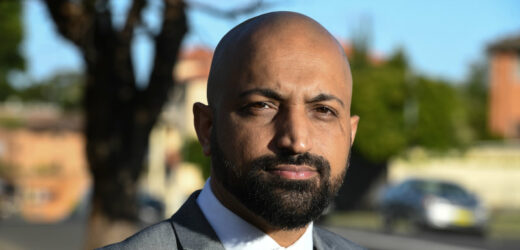Save articles for later
Add articles to your saved list and come back to them any time.
The agents who recruit international students to Australia’s universities and colleges must be better regulated to prevent the financial exploitation of their clients, an inquiry into the sector has heard.
“The students are literally cash cows,” student advocate Bijay Sapkota, a former president of the Council of International Students Australia, said ahead of Tuesday’s first hearing in Melbourne of the federal parliamentary inquiry into international education.
Bijay Sapkota, a former international student and ex-president of the Council of International Students Australia, is now an advocate for students coming to study in Australia.Credit: Peter Rae
After two years of flat-lining numbers during the pandemic, international students are pouring back into Australia, fuelling an overseas education industry worth about $40 billion annually, trailing only iron ore, coal and natural gas as an export. The Bureau of Statistics said last week that almost 143,000 international students arrived in Australia in February – 93,270 more than in the same month last year.
But on Tuesday, federal MPs conducting an inquiry into international education voiced concerns that agents who facilitate the entry of overseas tertiary students were reaping massive profits, without ever having to reveal how much they were being paid by universities and colleges.
Education agents recruit students for Australia’s universities and training colleges both offshore in countries including India, China, Nepal and Vietnam, and also from within Australia. While offshore agents generally work for universities that are keenly aware of the reputational risk from agents behaving badly, onshore agents within Australia often poach students enrolled in the university sector to vocational training colleges.
The chief executive of the International Education Association of Australia, Phil Honeywood, told the inquiry that most students who came to Australia to study enrolled here after an education agent’s recommendation.
While there were many excellent education agents, he said too many were funnelling students into courses that paid them maximum revenue rather than the best option for students.
Honeywood said onshore agents, in particular, should be more closely policed. “The government probably needs to [make] it very clear that, particularly for onshore education agents, where you can regulate them [they have to be],” he said.
Tuesday’s hearing came after The Age revealed that at least five Australian universities had banned or restricted students from specific Indian states in response to a surge of applications from South Asia and an accompanying rise in what Home Affairs described as fraudulent applications.
Home Affairs Minister Clare O’Neil told ABC Radio’s Patricia Karvelas on Tuesday that Australia’s international education system was “one of the biggest assets that we have in our migration system” because it brought young people from around the world to Australia for training. “It is also one of the main avenues through which exploitation occurs. So, we have to balance these two things,” O’Neil said.
Victorian Labor MP Julian Hill is a member of the education inquiry. Before entering parliament, he was head of international education for the Victorian government. He said during Tuesday’s inquiry hearing that there needed to be strong consideration of regulating education agents who worked in Australia. “The increasingly rapacious behaviour of [education] agents” meant there was growing public pressure to introduce new laws surrounding what education agents could do, he said.
Speaking to The Age, Sapkota, an international student who now advocates for those coming to Australia to study, agreed that education agents needed more regulation.
“The institution doesn’t care about the quality of education any more, they are just trying to get as many students as possible,” he said.
Sapkota said it was common for education agents to direct students to colleges that delivered the highest commission rather than the best outcome for students.
Labor MP Julian Hill.Credit: Elke Meitzel
Hill questioned university representatives at Tuesday’s hearing about why they did not make public how much of an international student’s tuition fee was paid to the education agent who helped recruit them. Group of Eight universities chief executive Vicki Thomson said the commission fees should be disclosed to students. “Why would we not require disclosure of commissions?” she said.
The inquiry has previously heard from G16, a vocational sector group that proposes bringing together training colleges modelled on the Group of Eight universities, in a bid to attract higher tuition fees.
The group’s financial model noted it was typical for education agents who brought students to Australia’s vocational colleges to be paid a commission of 40 per cent of a student’s tuition fees – which translates to a commission of upwards of $5000 for every student an agent gets into a vocational college.
G16 founder Nicholas Read said he was not advocating for commissions this high but that this level – and higher – was the reality of what education agents got paid. For this reason, much stronger regulation of the international education sector was needed.
“There needs to be regulation [of education agents]. Currently there’s nothing – it’s the wild west,” Read said.
He said the student migration system was “all a bit of a parlour game: the students and the education agents are now better educated than the colleges in knowing how to game the system”.
Another federal Labor MP taking part in the inquiry, Maria Vamvakinou, said that it was wrong to think that policing agents would fix all the problems with Australia’s international education sector. There was, Vamvakinou said, “very deliberate and aggressive misuse of the visa system, and migration agents, education agents and, to a certain extent, even those participating in it are fully aware of what’s going on. It’s almost institutionalised in a way”.
Honeywood said education agents should be regulated, similar to migration agents. The Department of Home Affairs in the 2022 financial year heard 132 complaints against migration agents, with 74 found to have breached a code of conduct and 11 sanctioned. This isn’t possible for education agents under current laws.
The Morning Edition newsletter is our guide to the day’s most important and interesting stories, analysis and insights. Sign up here.
Most Viewed in National
From our partners
Source: Read Full Article




